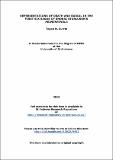Representations of death and burial in the first six sagas of Snorri Sturluson's 'Heimskringla'
Abstract
This thesis explores textual depictions of the burial of leaders in Snorri Sturluson’s
Heimskringla. Central to my argument is the close connection between representations of
burial and the broader qualities of good/bad kingship, and the relationship between kingship,
Christianity, and legitimacy. Snorri himself encourages his readers to concentrate on burial,
since his universal history is introduced by a Prologus dividing the ages of man into distinct
phases marked out by forms of burial which is then reinforced in the early chapters of
Ynglinga saga. My focus is upon the representations of burial in the pagan period – covered
in the first six sagas of the text – because such representations, covering as they do the distant
pagan past, allowed Snorri considerable licence to comment on the qualities of good and bad
rulership. I explore cremation burials and inhumation burials, noting the convergences and
ambiguities within Snorri’s accounts of such practices, and I raise in particular the tensions
between ‘correct’ Christian practices and pagan practices, and how to assess kingly qualities
of certain individuals based on their burial rites. My final chapter continues exploring such
themes by making a case for viewing hall burnings as a sort of ‘negative burial’, rich with
associations of bad kinship and instability. This discussion of the representations of death and
burial practice contributes new means of assessing and reading a particularly rich, but
difficult text.
Type
Thesis, MPhil Master of Philosophy
Collections
Items in the St Andrews Research Repository are protected by copyright, with all rights reserved, unless otherwise indicated.

